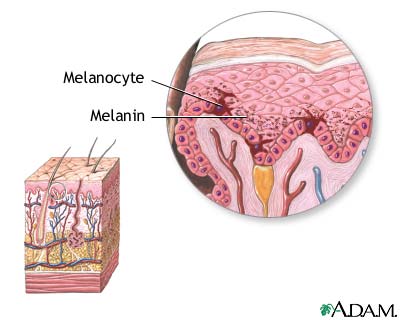Treatment
The goal of treatment is to relieve symptoms. Treatment depends on the severity of the disorder.

Treatment involves protecting the skin and eyes from the sun:
* Reduce sunburn risk by avoiding the sun, using sunscreen, and covering up completely with clothing when exposed to the sun.
* Sunscreen should have a high sun protection factor (SPF).
* Sunglasses (UV protected) may relieve light sensitivity.
Glasses are often prescribed to correct vision problems and eye position. Eye muscle surgery is sometimes recommended to correct abnormal eye movements (nystagmus).
Support Groups
National Organization for Albinism and Hypopigmentation — www.albinism.org
International Albinism Center — www.med.umn.edu/ophthalmology/centers/albinism/home.html
Hermansky-Pudlak Syndrome Network — www.hpsnetwork.org
Prognosis (Expectations)
Albinism does not usually affect lifespan. Hermansky-Pudlak syndrome can, however, shorten lifespan due to lung disease or bleeding problems.
People with albinism may be limited in their activities because they can’t tolerate the sun.
Complications
* Decreased vision, blindness
* Skin cancer
Calling Your Health Care Provider
Call your health care provider if you have albinism or symptoms such as light sensitivity that cause discomfort. Also call if you notice any skin changes that might be an early sign of skin cancer.
Albinism: Overview, Causes
Albinism: Symptoms & Signs, Diagnosis & Tests
Albinism: Treatment
Reviewed By : Luc Jasmin, MD, PhD, Departments of Anatomy and Neurological Surgery, University of California, San Francisco, CA. Review provided by VeriMed Healthcare Network. Also reviewed by David Zieve, MD, MHA, Medical Director, A.D.A.M., Inc.
